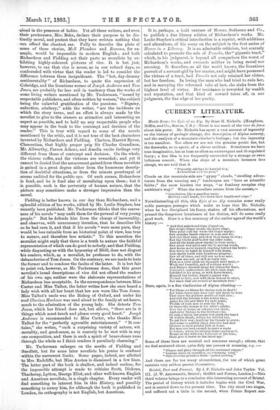CURRENT LITERATURE.
" And that unlettered time srpped on,
Saw tropio climes invade the polar rings.
Then polar cold lay waste the tropic merge; Saw monster beasts emerge in ooze and air.
And run their race, and stow their bones in clay; Saw the bright gold•badew the elder rocks, And all the gems grow crystal in their caves ; Saw plant wax quick and stir to moving worm,
And worm move upward, reaching toward the brute :
Saw brute by habit fit himself with brain, And startle earth with wondrous progeny ; Saw all of these, and still saw uo true man.
For man was not, or still so lowly was,
That as a little child his thoughts were weak,—
Weak and forgetful, and of nothing worth ; And Nature stormed along her changeful ways, Unheeded, undescribed, the while man slept Infolded in his germ, or with fierce brutes,
Himself but brutal, waged a pigmy war,
Unclad as they, and with them housed in caves, Nor knew that sea retired or mountain rose."
Here, again, is a fine vindication of Alpine climbing :— "Yet blame no blame for daring rash to death!
For while brave men have sons will deeds be done
That show the perilous mettle of bold sires ; And still the fearless is the nobler race, Apter for life and fitter for rude truth, Prolific of such men as seek the Pole, Or brave the savage in hot Afrie's glades, Give law at home, or colonise new lends, And carry Europe to the farthest isles. Of such a blood, the youth will pluck the beard Of wolfish Death, within Isis dabbled lair, To get their way, laughing his threats to scorn ; And some to quickly slays, who else had died Obscure in later painful beds at home. But men are born enough to spare a waste In heroes, whose far-shining names undimmed, Bound on the withering forehead of the time. Shall give it lustre to the latest age."
Some of these lines are musical and sonorous enough ; others, that we find scattered about, quite defy our powers of scanning, e.g. :— "Flames and glory through all the curtained vapors." Legions move on soundless, on returning wing." " Ourselves the priceless stake—'gainst nothing."
And there are far too many alexandrines, the use of which great metrists very seldom permit themselves.
Monte Rosa : the Epic of an Alp. By Starr H. Nicholls. (Houghton, Miffiin, and Co., Boston, U.S.)—There is too much of the tour de force about this poem. Mr. Nicholls has spent a vast amount of ingenuity on the history of geologic change, the description of Alpine scenery, and the analysis of a mountain, climber's feelings ; but the ingenuity is too manifest. Too often we see not the genuine poetics fire, but the fireworks, so to speak, of a clever artificer. Sometimes we have true imagination, bat at least as often an extravagant and ill-regulated fancy ; a fine idea is too frequently succeeded by a strange or even ludicrous conceit. When the slope of a mountain becomes less abrupt, we are told that it "Presently sal:Ones its hurried rise, As breathless with the paa."
Clouds on the mountain-side are " gypsy " clouds, "strolling adven- turers from the teeming sea ;" landscapes are "bare as scientific faiths ;" the snow hinders the steps, "as feathery scruples clog ambition's way." When the travellers return from the ascent,—
" Graritation, like a guardian auras
Holding small hands, lots down their lengthened steps."
Notwithstanding all this, this Epic of an Alp contains some really noble passages, passages which make us hope that Mr. Nicholls, when he has disciplined his fancy, shaken off his affectations, and pruned the dangerous luxuriance of his diction, will do some really good work. Here is a fine summary of the earlier ages of the world's history :—


































 Previous page
Previous page